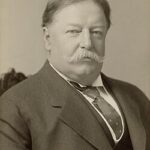President William Howard Taft’s antitrust lawsuit against U.S. Steel Corporation in 1911 created one of the most damaging political feuds in American history. The Justice Department challenged U.S. Steel’s 1907 acquisition of Tennessee Coal, Iron & Railroad Company. This merger had received Theodore Roosevelt’s blessing during the Panic of 1907.
The Taft U.S. Steel Antitrust Decision
Attorney General George Wickersham filed suit in federal court on October 26, 1911. The government argued that U.S. Steel violated the Sherman Antitrust Act. The lawsuit specifically targeted the Tennessee Coal and Iron acquisition. Taft believed the merger created an illegal monopoly that harmed competition. ⚖️
Roosevelt’s Original Approval
Roosevelt had personally approved the 1907 merger during financial crisis. J.P. Morgan and U.S. Steel executives convinced Roosevelt the acquisition would prevent economic collapse. The former president viewed his decision as necessary emergency action. He believed Taft’s lawsuit questioned his integrity and judgment. 💰
Political Calculations Gone Wrong
Taft hoped aggressive trust-busting would establish his independent presidential legacy. He wanted to prove his commitment to antitrust enforcement exceeded Roosevelt’s record. The president underestimated Roosevelt’s emotional attachment to his 1907 decision. This miscalculation would destroy their friendship and split the Republican Party. ⚠️
Impact:
The Taft U.S. Steel lawsuit triggered a cascade of political consequences that reshaped American politics for decades. Roosevelt felt personally betrayed by his handpicked successor’s challenge to his presidential judgment. The legal action transformed a private disagreement into a public political war.
Republican Party Fracture
The lawsuit drove an irreparable wedge between progressive and conservative Republicans. Roosevelt supporters viewed Taft as ungrateful and politically naive. Conservative Republicans backed Taft’s legal approach but questioned his political timing. The party split weakened Republican electoral prospects nationwide. 🔥
1912 Presidential Election Chaos
Roosevelt’s anger over the antitrust case motivated his 1912 presidential comeback attempt. He challenged Taft for the Republican nomination despite their previous alliance. When Republicans renominated Taft, Roosevelt launched the Progressive “Bull Moose” Party. The Republican split handed the presidency to Democrat Woodrow Wilson. 📉
Long-Term Antitrust Policy Impact
The U.S. Steel case established important legal precedents for future antitrust enforcement. Federal courts gained clearer authority to review presidential emergency decisions. The lawsuit demonstrated that no corporate merger was immune from later legal challenge. However, the political costs overshadowed these legal achievements for decades. 🌍
